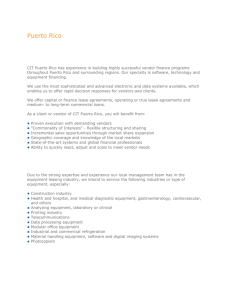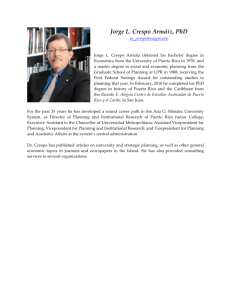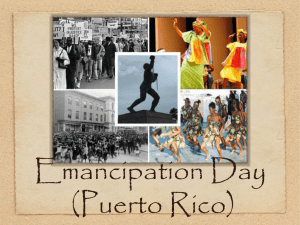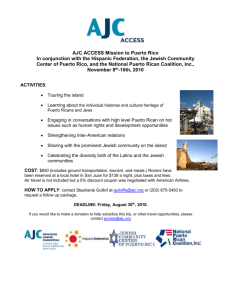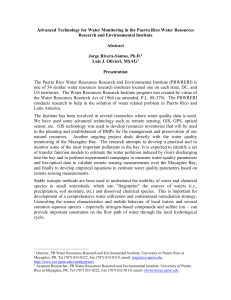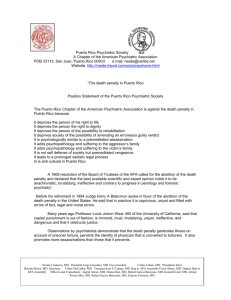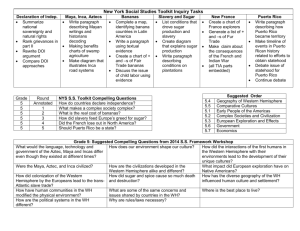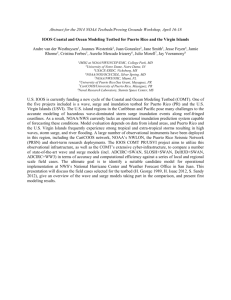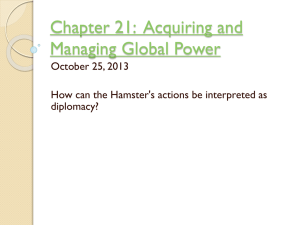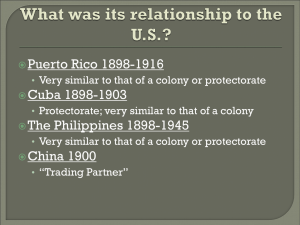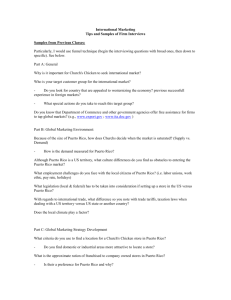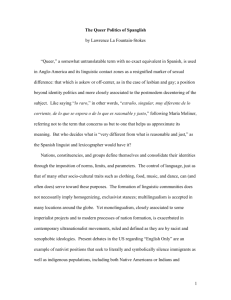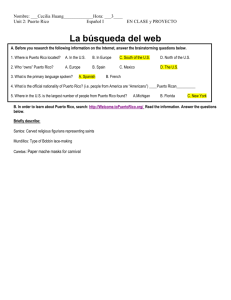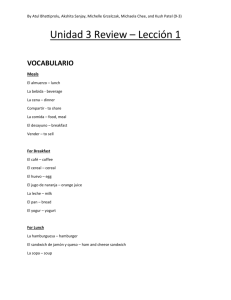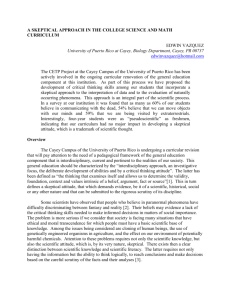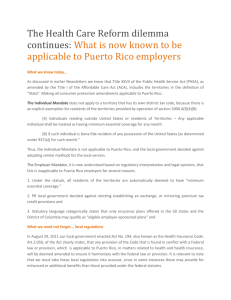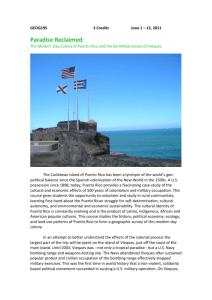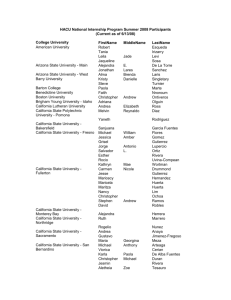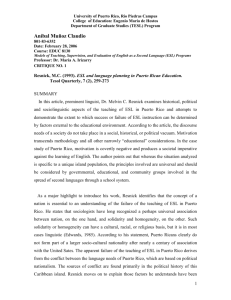Puerto Rican Cultural Interview
advertisement
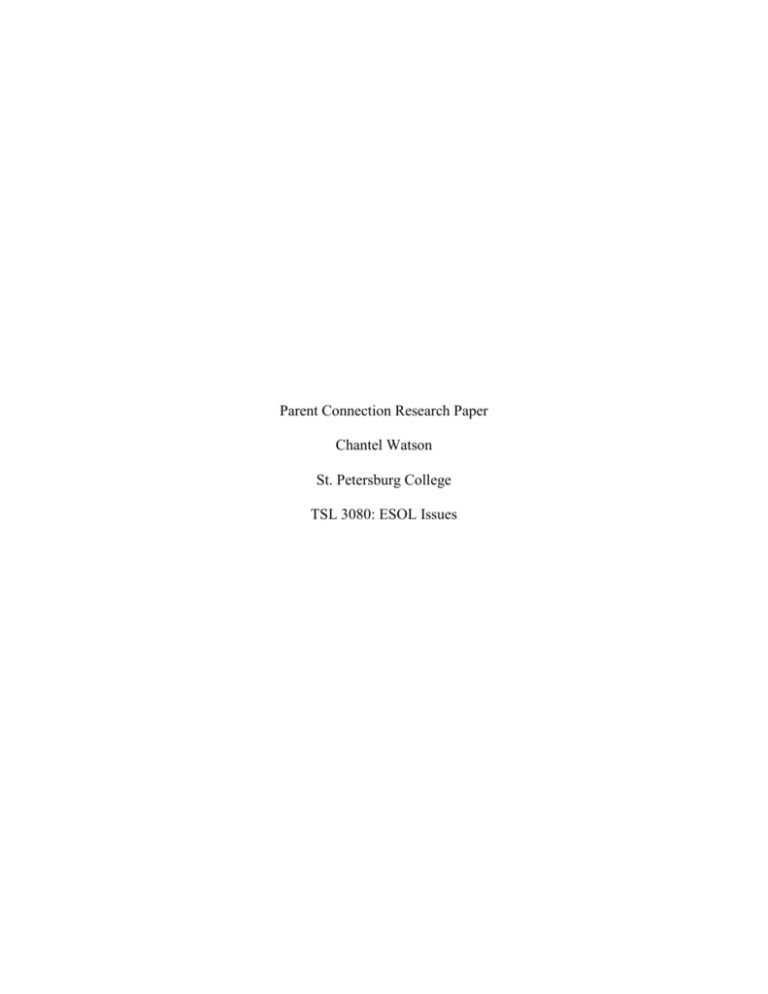
Parent Connection Research Paper Chantel Watson St. Petersburg College TSL 3080: ESOL Issues Part 1: Christopher is a twenty-two year old male, born on August 21st, 1990. He was born in Catano, Puerto Rico which is considered the projects. He moved to America when he was 6 almost 7 years old with his family. His family moved to USA because there are more job opportunities available in USA than in PR. Christopher’s first language is Spanish, but he gradually learned English when he came over to Florida. Part 2: 1. Values, Beliefs, and Practices: Q- What clothing or accessories are considered acceptable? A- In my family, we never wore shorts, tank tops or t-shirts. We always dressed to impress, which made you look more presentable. Only time we wore tennis shoes was when we were allowed to go play. No earrings on men/boys, no tattoos; they were considered to disrespectful to your body, no hats, clean shaven, and fresh haircuts. Wearing the rosary was socially acceptable everywhere in Puerto Rico. Q- What are major cultural celebrations? A- Puerto Rican Day Parade is a huge deal for us. We'd all wake up and meet in one area for the parade, go buy beer and food. After the parade we'd go to my grandma’s house because she was the best cook in the family. She’d make rice & beans, pasteles, alcapurrias and people would bring drinks. Whoever wanted to drink brought their own beers; all they’d drink was Heineken, since they’re all Spanish. After the feast the music would be turned up and there was dancing and more drinking. By the end of the night, the whole block was there celebrating with everyone. Q- What is the relationship between law enforcers and the community? A- The police gave more breaks in PR than in the US because they know how it is in the projects. Little kids had to be on the streets selling drugs in the projects because their parents’ couldn’t find work. You had to do what you had to do to get by. One thing the police take very seriously is when a man puts his hands on a woman. That’s when the police don’t give breaks. In the situation, if the cops’ didn’t arrest you, you had to watch your back before the community found you. They take abuse very seriously. It’s the ultimate disrespect. So ultimately, the police were more lenient in Puerto Rico. Q- What methods of teaching and learning are used in the home? A- My mom taught me by making me flash cards because we didn’t have computers. Basically, she taught me how she was taught. We had a library but we didn’t live close to it. My mom taught me English by getting me a program called Ingles sin Barrera’s which was basically a combination of Rosetta stone and hooked on phonics. Q- How many years are children expected to attend school? A- Mandatory 12 years for everyone, just like here in the Florida. If you dropped out, everyone looked at you like an embarrassment to your family. Even if you dropped out, you still had to find work ASAP because you weren’t allowed to stay home. 2. Roles and Status Q- What expectations do parents hold for boys and girls? A- For boys: When you’re younger you had to throw out the trash, cut the grass, get good grades in school, and behave. But when you’re older you’re expected to get a job, treat your women well, and have a family. Also my mother always expected me to end up with a Spanish woman. For my sister: when she was younger she had to do dishes after homework, clean her room, and help clean the house. When she was older she had to do all the same chores but she was also expected to get a job and keep herself looking presentable at all times. Everyone, men and women, were required to learn how to cook at a young age. Q- What kind of home environment is common (extended v. nuclear families)? A- In my home it was mostly mom, grandma, and the kids. If my dad was around, then he was around. He was never dependable. Q- What activities are considered appropriate or forbidden? A- Allowed: sports, going to the mall, to the movies, hanging out with friends, studying, spending time with family, listening to music, watching wrestling, etc… Forbidden: cussing, fighting, talking back to your mother, coming home late, no going out on school nights, and anything illegal. Q- What topics of discussion are considered appropriate or forbidden? A- Allowed: school, jobs, basically anything positive. Forbidden: Sex (unless you’re 16 or older), drugs, romantic relationships, guns, violence, illegal activities, any family gossip had to stay within the home. Q-What kinds of work or occupations are considered acceptable? A- Doctor, lawyer (if you could afford to go to college), otherwise, mechanic, farmer, owning your own business, lawn maintenance, teacher, etc… 3. Family Socialization Q- What are the naming practices in your culture? A- A lot of people got their names from the bible, or a typical Spanish name. Q- How are people addressed? A- For police: Official and then name. For your elders: Titi: Aunt, Tio: Uncle, Abuela: grandma, Mami: Mom, Papi: Dad. For people not in the family it was Senor or Senora. For friends, just call them by their name. For acquaintance: senorita or senor. Q-What are the child rearing practices? A- If I disrespected my mother or talked back, she beat the crap out of me. Spanish parents disciple strictly. One time, she had me kneel on rocks while holding a pot of water straight above me. If I spilled the water, I’d get hit with a belt and have to start again. Another time, she went and got a telephone wire and spanked me with it. Discipline is harsh in Puerto Rico. Q- Who cares for the children and how? A- If family wasn’t around; neighbors were depended on to help care for child, or even older siblings and extended family. Q- What are the food preferences? A- Mainly rice & beans. As well as pork, chicken, and beef. 4. Deep Culture: How does your culture deal with the following? - Courtship & Marriage: Don’t get married unless you know its forever. Divorce is unacceptable. -Health & Medicine: Men are stubborn and don’t go to the doctor unless forced by women. Women always had insurance, no matter what. - Religion: You always had to go to church on Friday Saturday and Sunday. First communion is mandatory. We were taught to always pray before going to bed and before meals. - Grooming: Men: no full beards. Hair had to either be braided, ponytail, faded or bald. No afros. Women: always had their nails and hair done. They woke up every day and did their hair and makeup and had to dress like a lady. - Sex roles: Multiple sexual partners were frowned upon. Romance was a must, and sex before 18 was frowned upon, but people obviously did it anyway. Throughout the research paper I conducted and doing the cultural interview I have learned the value of education in Puerto Rico is extremely important to them. This is a cultural misconception I had about Puerto Ricans in general. Respect and family is something that is highly important as well. Families typically are large and extended and the respect of elders and women are taken seriously. I was surprised how serious the respect that men must have for woman was and how if they ever men are to mistreat woman how serious of a crime they take it as. I would say that there were not mismatches of information between my research and my interviewee, with the question that I asked and the information I researched. I could use this information I’ve found in my own classroom by having more insight for the Puerto Rican culture, I can understand and respect them more. A piece of information I will keep in mind is that the mothers are usually the disciplinary and the ones who are involved in their childrens education.
